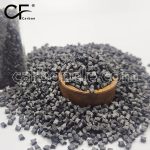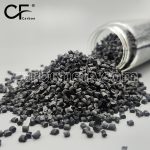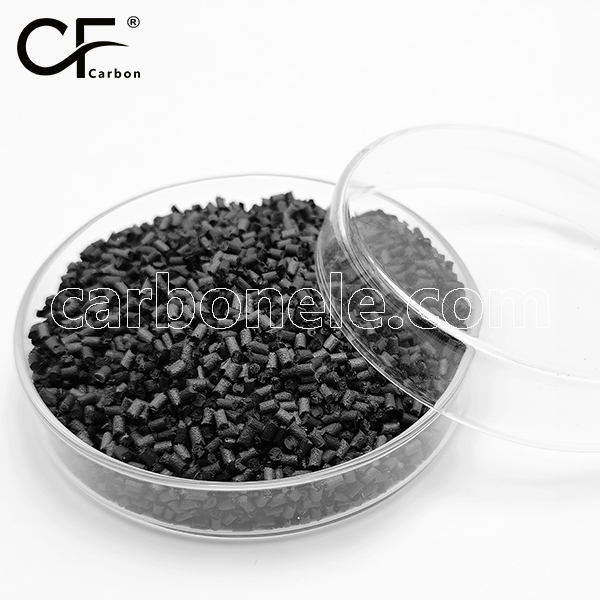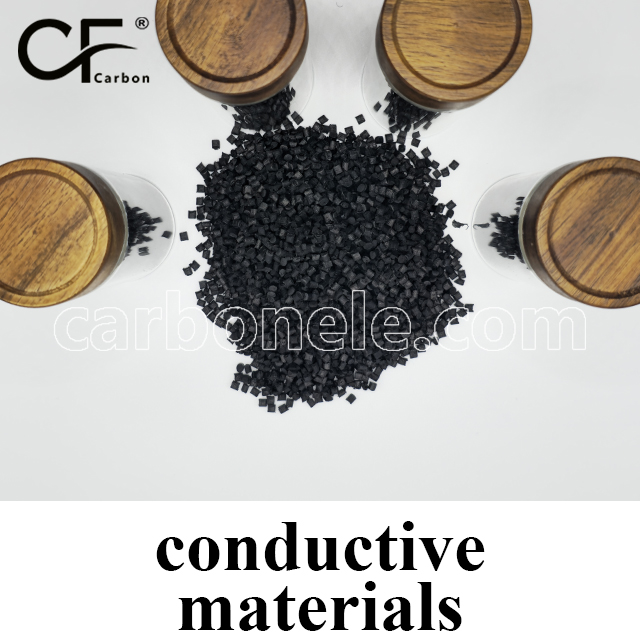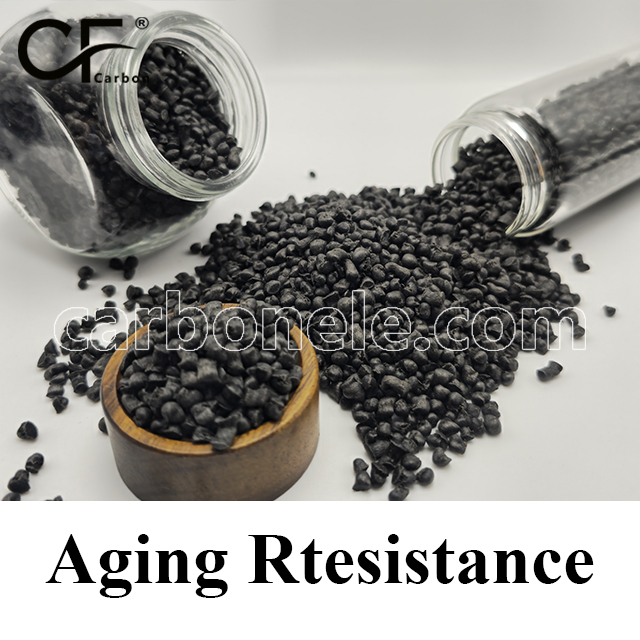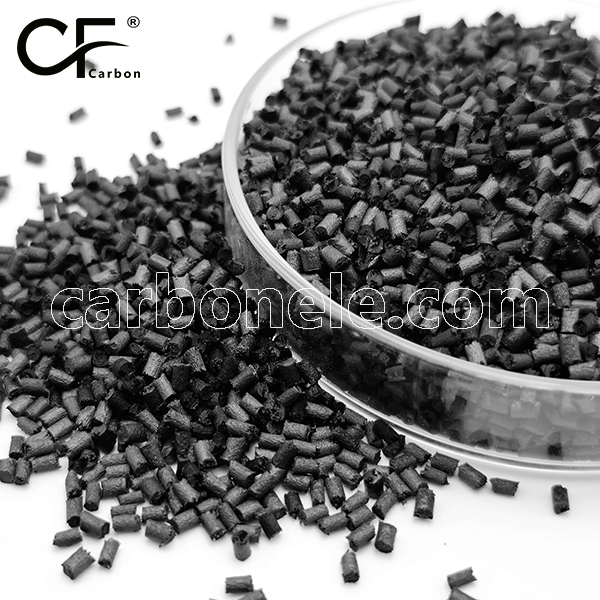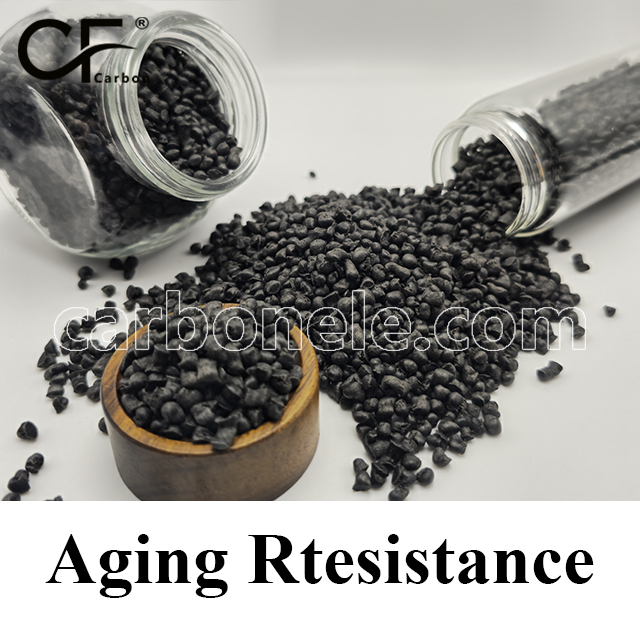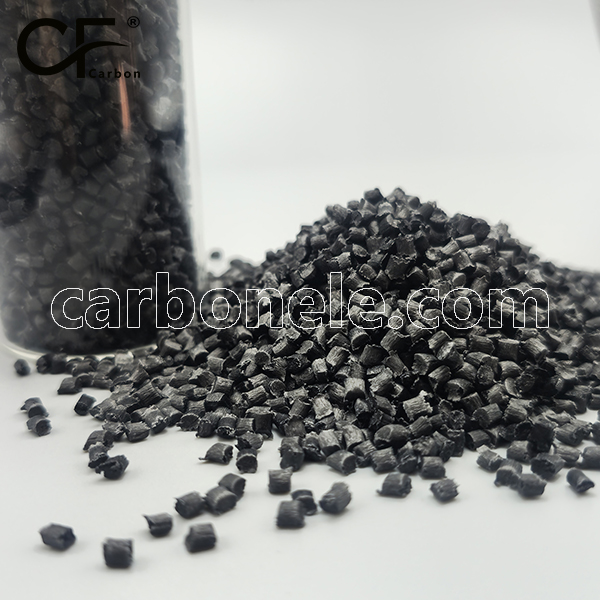
PP-CF20 PP Reforced 20 % Carbon Fiber
PP-CF20 is a 20% carbon fiber-reinforced polypropylene composite with enhanced strength, rigidity, heat resistance, and lightweight properties. It is suitable for high-load automotive parts, heat-sensitive components, engine covers, and electronics. Its low density makes it lighter than metal, improving fuel efficiency and reducing emissions. It retains polypropylene’s chemical resistance and low shrinkage, making it ideal for applications like automotive bumpers, home appliances, electronics, and industrial parts.
- Model number: PP-CF-BCA2
- Matrix Resin: Polypropylene (PP)
- Reinforcing Filler: Carbon fiber
- Appearance: Granules
- Grade: Injection/extrusion grade
- Packaging: 25kgs/bag
PP-CF20 is a reinforced polypropylene composite material. PP CF20 is widely used in industrial manufacturing products, especially in fields such as automobiles, home appliances, electronic appliances, and construction that require high material strength, heat resistance, and lightweight. Polypropylene is represented as PP inside, while CF represents Carbon Fiber. “20” indicates that the material contains 20% carbon fiber.
PP-CF20 Material properties
High strength and rigidity
Due to the addition of 20% carbon fiber in polypropylene (PP), PP CF20 has higher strength and rigidity than pure polypropylene. At the same time, the addition of 20% carbon fiber greatly enhances the load-bearing capacity of PP, making it have stronger tensile strength, bending strength, and impact toughness. Because these characteristics make PP CF particularly suitable for manufacturing high load structural components, such as automotive parts, building materials, and industrial equipment components.
Heat resistance and dimensional stability
Due to the strengthening effect of carbon fiber, PP CF20 has high heat resistance,. Under high temperature conditions, its material and shape stability will not change. Due to these characteristics, PP CF20 is widely used in components that create high-temperature environments, such as car engine hoods, radiator grilles, and heating element housings in household appliances.
Lightweight
Excellent chemical resistance
Polypropylene itself has strong chemical corrosion resistance and can resist the damage of most acids, bases, and organic solvents. This characteristic will not be changed by the addition of carbon fiber reinforced materials. Therefore, PP CF20 has strong resistance to chemical corrosion, making it widely used in chemical equipment, pipelines, and storage tanks that frequently come into contact with chemicals or corrosive substances.
Low shrinkage and high precision
Due to the low shrinkage rate of polypropylene (PP) during injection molding, and the significant reduction of deformation during cooling by filling with carbon fibers. This means that the properties and dimensions of each component manufactured using PP CF20 are almost identical, making it suitable for precision industrial products with strict shape and size requirements.
Application Fields
Automotive Industry
PP-CF20 has a wide range of applications in the automotive industry, especially suitable for manufacturing components with high requirements for strength and lightweight, such as body structural components, door interior panels, instrument panel frames, and bumpers. Due to its high strength, heat resistance, and light weight, PP-CF20 can help car manufacturers reduce the overall weight of their vehicles while ensuring safety and durability, thereby improving fuel efficiency, reducing energy consumption, and emissions. In addition, the chemical and corrosion resistance of PP CF20 also make it suitable for components such as liquid delivery pipelines and storage tanks in automobiles.
Home appliance industry
In the field of home appliance manufacturing, PP-CF20 is used to manufacture the outer shell and internal parts of large household appliances such as washing machines, dishwashers, refrigerators, etc. The operation of these household appliances is usually accompanied by high temperatures and humidity, therefore requiring the use of heat-resistant, durable, and non deformable materials. PP-CF20 not only meets these requirements, but also ensures the long-term reliability of household appliance components. In addition, due to its excellent dimensional stability, PP-CF20 can also improve the appearance quality of products and reduce the problem of low yield.
Electronic appliances
In the electronics and electrical industry, PP CF20 is commonly used in the manufacturing of electronic device casings and support structures due to its excellent mechanical properties and electrical insulation. For example, in large electronic products such as televisions and audio equipment, sturdy and lightweight casings are required, while PP-CF20 can provide better protection performance while reducing overall weight. In addition, PP CF20 can resist the heat generated by electronic devices during long-term operation, ensuring the long-term stable operation of the equipment.
Construction and Industrial Equipment
In the construction industry, PP-CF20 is used to manufacture various building components such as wall panels, roof panels, and insulation materials due to its high strength and durability. Its resistance to chemical corrosion makes it suitable for components in buildings and industrial equipment that come into contact with chemicals or moisture. PP-CF20 is also widely used in industrial equipment such as pumps, valves, and storage tanks, which require long-term operation in harsh environments and require materials with good mechanical properties and corrosion resistance.
Environmental Protection and Sustainability
PP-CF20 not only has excellent material properties, but also has good environmental characteristics. Firstly, carbon fiber and polypropylene are relatively environmentally friendly materials with a low carbon footprint during the production process. Secondly, the lightweight characteristics of PP-CF20 help reduce energy consumption and carbon dioxide emissions of vehicles such as cars, thereby contributing to more sustainable development. In addition, PP-CF20 can be recycled and reused through mechanical processing or chemical decomposition, further reducing its negative impact on the environment.
If you want to get more information about PP-CF20, you can vist our Youtube.
Click here to contact us.
PP-CF20 granules
PP-CF20 granules are tiny pellets composed of polypropylene and five percent carbon fiber for reinforcement. The enhanced strength and rigidity offered by carbon fibers are combined with the lightweight and chemical-resistant qualities of polypropylene to create this composite material.



Frequently Asked Questions
Carbon (Xiamen) New Material Co., Ltd. aims to provide buyers with "one-stop" worry-free high-quality services. Here you can find all information about carbon fiber engineering plastics. If you still have questions, please send us an email for consultation!
-
How can I contact the manufacturer of a product that interests me?
When you find a product you are interested in, you can contact the manufacturer directly by sending an email and we will get back to you as soon as possible.
-
How do I find the products that interest me?
All you need to do is enter the keyword, product name in the search window and press the Enter key on your keyboard. Your search results page will then be displayed. You can also search within the product category pages on the home page. Each category is divided into subcategories, allowing you to refine your search and find products that interest you.
-
Where will I find a buying guide?
Please contact our after-sales service directly and we will provide you with a comprehensive operating guide.
-
What are CF Reinforced Thermoplastic Composites?
CF Reinforced Thermoplastic Composites are materials where carbon fibers are incorporated into a thermoplastic matrix. They combine the strength and stiffness of carbon fibers with the processability and recyclability of thermoplastics. For instance, they are used in automotive parts like bumper beams.
-
What are the benefits of CF Reinforced Thermoplastic Composites over traditional composites?
The key benefits include faster production cycles, easier recyclability, and better impact resistance. They also offer design flexibility. An example is in the manufacturing of consumer electronics casings where complex shapes can be achieved more easily.
-
How are CF Reinforced Thermoplastic Composites processed?
Common processing methods include injection molding, extrusion, and compression molding. Injection molding is widely used for mass production. For example, in the production of small components for the medical industry.
-
What industries use CF Reinforced Thermoplastic Composites?
They are utilized in aerospace, automotive, medical, and sports equipment industries. In aerospace, they can be found in interior components. In the medical field, they might be used in prosthetics.
-
How does the carbon fiber content affect the properties of the composites?
Higher carbon fiber content generally leads to increased strength and stiffness but may reduce ductility. A moderate content is often balanced for specific applications. For example, a higher content might be preferred in structural parts of a race car.
-
What are the challenges in using CF Reinforced Thermoplastic Composites?
Challenges include higher material costs, complex processing equipment requirements, and ensuring uniform fiber dispersion. Issues with adhesion between the fibers and the matrix can also arise. An example is in achieving consistent quality in large-scale production.












